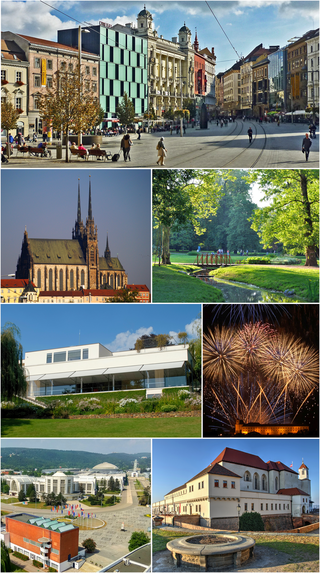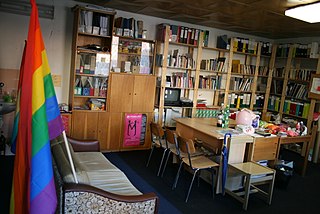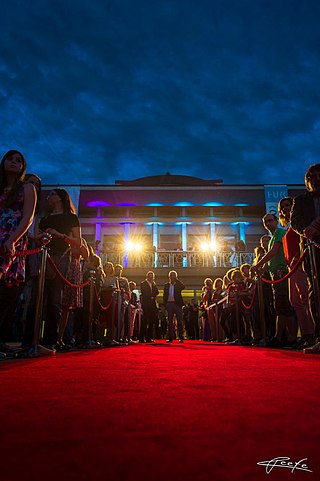Related Research Articles

The Karlovy Vary International Film Festival is an annual film festival held in Karlovy Vary, Czech Republic. The Karlovy Vary Festival is one of the oldest in the world and has become Central and Eastern Europe's leading film event.

Brno is a city in the South Moravian Region of the Czech Republic. Located at the confluence of the Svitava and Svratka rivers, Brno has about 400,000 inhabitants, making it the second-largest city in the Czech Republic after the capital, Prague, and one of the 100 largest cities of the European Union. The Brno metropolitan area has approximately 730,000 inhabitants.

Czech cinema comprises the cinema of Czech Republic as well as cinema of Austrian-Hungarian Empire or Slovakia and Germany, while this country was a part of other countries. Some early findings enabling the birth of cinematography were made by Czech scientists in the 19th century.

Jiří Menzel was a Czech film director, theatre director, actor, and screenwriter. His films often combine a humanistic view of the world with sarcasm and provocative cinematography. Some of these films are adapted from works by Czech writers such as Bohumil Hrabal and Vladislav Vančura.

Masaryk University (MU) is the second largest university in the Czech Republic, a member of the Compostela Group and the Utrecht Network. Founded in 1919 in Brno as the second Czech university, it now consists of ten faculties and 35,115 students. It is named after Tomáš Garrigue Masaryk, the first president of an independent Czechoslovakia as well as the leader of the movement for a second Czech university.
The Prague International Film Festival, also known as Febiofest, is one of the largest film festivals in the Czech Republic and the second most prestigious festival in the country. The festival presents a wide spectrum of contemporary and retrospective examples of high-quality film including alternative, film-school and amateur works to a diverse viewing public.

Emília Vášáryová, Doctor Artis Dramaticae (hon.) is a Slovak stage and screen actress, whom Variety and other publications refer to as the "First Lady of Slovak Theater". During a career of more than five decades, she has received numerous awards including Meritorious Artist (1978), the Alfréd Radok Award (1996), the Czech Lion Award, the Golden Goblet Award (2008), and a 2010 ELSA award from the Czech Film and Television Academy (2010). Because her younger sister is former diplomat Magdaléna Vášáryová, the daily newspaper iDNES said fans consider her an "Honorary Consul of Czech and Slovak Relations".

František Brikcius is a Czech cellist.

Mezipatra is a Czech queer film festival screening films with gay, lesbian, bisexual and transgender themes. The name Mezipatra translates as "mezzanine" and refers to the festival's mission: creating space for meeting of people regardless of their gender or sexual identities. Each edition explores a chosen theme and hosts a variety of international guests. The accompanying events range from lectures and debates to art openings, theatre performances as well as exciting parties. It takes place annually in November in Prague and Brno with related events in Ostrava, Olomouc and other cities in Czech Republic. Throughout the year Mezipatra offers additional screenings within the Mezipatra Approved edition. Mezipatra also participates in Prague Pride festival by organizing screenings and debates with LGBT themes.

STUD Brno is a Czech activist association of lesbians, gays, and their friends.

Walking Too Fast is a Czech thriller and drama film directed by Radim Špaček. It was released in 2010. It is a psychological story about relations between the secret police (StB) and the dissident movement, set in communist Czechoslovakia in the 1980s. The film was likened to the German film The Lives of Others.

The Odesa International Film Festival is an annual film festival held in the middle of July in Odesa.
Listapad, also known as Minsk International Film Festival (MIFF) or Minsk International Film Festival Listapad, is an annual film festival which takes place in November in Minsk, Belarus. It is the largest such festival in Belarus.

IFF Art Film, previously known as Artfilm and Art Film Fest, is an annual international film festival founded in Trenčianske Teplice, Slovakia in 1993, shortly after the dissolution of Czechoslovakia. The first event was held on 14 June 1993, under the auspices of UNESCO. It is the longest continuously running international film festival in the country.
The video game industry in the Czech Republic has produced numerous globally successful video games such as Operation Flashpoint: Cold War Crisis and the subsequent ArmA series, the Mafia series, Truck Simulator series, the Kingdom Come: Deliverance series, the Samorost series and others. There were 300–400 video game developers and around 30 video game companies focusing on video game development in 2014. In 2017, the country had 1,100 developers and 47 companies. Video games are also considered by some experts to be the country's biggest cultural export. The video game industry did not enjoy a good reputation and was unsupported by the state until 2013, when the Ministry of Industry and Trade started to seek ways to kickstart the economy. By 2014, programs were planned to support the video game industry. Another problem is a lack of video game development specialization at any university.

The Vilnius International Film Festival (VIFF) Kino pavasaris is a film festival held annually in March in Vilnius, Lithuania since 1995, and is the largest film festival in the nation in number of films and audience. It is one of the most anticipated annual cultural events in Lithuania.
Jakub Kroner is a Slovak filmmaker. His second feature film, Lóve (2011), became the box office number-one Slovak-language film of the year in his home country, while ranked the third highest-grossing ever since the independent Slovakia. As the youngest generation member of the Kroner acting family, he is the son of Janko Kroner and a grandson of Jozef himself.

Film Festival of Faculty of Informatics, Masaryk University is a student film festival held annually in May at the Faculty of Informatics of the Masaryk University in Brno, Czech Republic. Short films of various genres produced by students with an assistance of Laboratory of Electronic and Multimedia Application (LEMMA) are showcased during one festival evening. The festival is held in the building of the Faculty of Informatics and from 2016 - 2023 also in the University Cinema Scala. Each year 800–1000 visitors attend to see the new student projects. Initially, the festival was supervised by the dean of the Faculty of Informatics, since 2011 by the mayor of Brno as well.

Gymnázium třída Kapitána Jaroše is a public gymnasium in Brno, Czech Republic.
References
- ↑ "Filmový festival Cinema Mundi v Brně končí. Po pěti letech". Deník.cz (in Czech). 2 March 2016. Retrieved 9 October 2017.
- "The world comes to Brno". praguepost.com. 24 February 2014. Retrieved 8 September 2014.
- "V Brně začíná filmová událost Cinema Mundi". iDnes.cz. 23 February 2010. Retrieved 6 February 2012.
- "Festival Cinema Mundi 2011 nabídne to nejlepší ze světové kinematografie". listyjm.cz. Retrieved 20 January 2013.
- "Mezinárodní filmový festival Cinema Mundi v Brně startuje potřetí". brnonovinky.cz. Retrieved 20 January 2013.